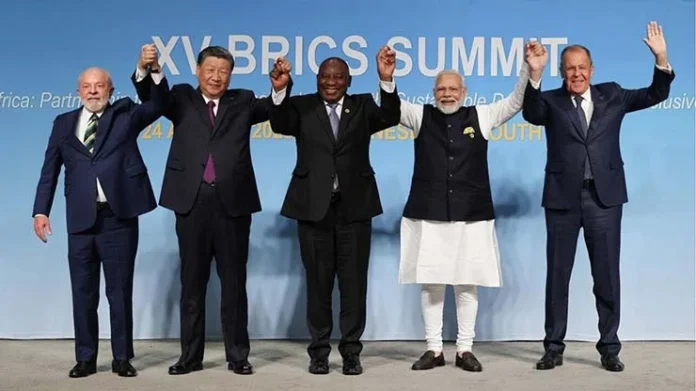Diplomacy is all about hope and possibilities. The latter is more significant in any diplomatic action or act. Without contemplating the possibilities of a particular action or act, no nation-state can hope to become a great power, no matter how powerful or resource-rich it is.
In the context of the BRICS grouping, this is exactly the case, the latest BRICS summit in South Africa’s Johannesburg was a stupendous success as far as India is concerned.
The BRICS countries approved the entry of six new members to the elite grouping – Ethiopia, the UAE, Egypt, Iran, Saudi Arabia and Argentina. Prime Minister Narendra Modi appeared exuberant on the expansion of the grouping, arguing that expanded grouping is a force for good for the world.
But a broader question emerges: Is it a direct challenge to the hegemony of China?
The Chinese question
History is witness to great power rivalries throughout the centuries – Athens v/s Sparta, Roman v/s Ottoman Empire, the USA v/s the USSR etc. Since the onset of the new millennium, it has been the US v/s China rivalry, but since the beginning of the second decade of this century, it has been the India-China rivalry.
The rivalry spans almost every sector possible, but at present it is locked in the domains of technologies, militaries, economic resilience etc.
The expansion of the BRICS grouping appears; at least in the diplomatic gestures that India had given to China only an informal meeting with the Chinese President and no official engagement shows that India means business.
The standoff at Ladakh from June 2020 onwards, which continues even today clearly shows that the nature of bilateral ties is no longer normal.
To compound matters further, China has been doing flip-flops on the resolution of the border dispute even as it continues to poke its nose into India’s internal matters.
The BRICS grouping expansion, therefore, leaves no room for doubt that it is a challenge to China.
The nature of the challenge
The nature of the challenge needs to be understood first. In the old BRICS grouping, China was the clear hegemon, as it was the second-largest economy along with the third-largest military force in the world.
On top of that the AIIB or Asian Infrastructure Investment Bank, which was designed by the BRICS countries, apart from the New Development Bank or BRICS bank to challenge the Bretton Woods Institutions is clearly dominated by China as it owns the largest number of shares and finances the most amount.
However, the conditions and rules of the game have changed in the expanded BRICS grouping. India has excellent relations with the UAE, Saudi Arabia and the rest of the countries, China too has good ties but certainly not in the way India has.
While China’s influence among the members mainly covers the areas of economics, trade, technology and defence, India’s horizons of interest encompassing the ties are broader, to put it in all-inclusive terms, it is civilisational by nature.
On top of that India is already negotiating Free Trade Agreements (FTA) with other countries at an aggressive pace.
Perhaps a proposed mega FTA covering all BRICS countries sans China could certainly give India a competitive edge.
A key nature of this challenge is the need to bolster the global acceptability of India’s currency – the rupee. The RBI has commenced the persuasion process whereby it is asking other countries to settle trade in local currency terms, the UAE and Australia (which, however, is not a member of this grouping) have agreed to do so.
With the value of India on the ascent in the diplomatic high table, it is very likely that other countries may soon follow suit.
The challenge will not be easy
Challenging the dragon won’t be that easy. After the dollar, the Yuan is still more acceptable among the global currencies than the rupee. Also, India’s per capita income is the lowest among the G20 countries.
So, New Delhi will have a lot of heavy lifting to do before it can outrightly challenge China, but at least some punches can be given, and the BRICS forum appears to be the quintessential platform for some diplomatic shadowboxing.
–The writer is currently working as a Research Associate at Defence Research and Studies (dras.in) and is a columnist. The views expressed are personal and do not necessarily reflect the views of Raksha Anirveda
–The writer is currently working as a Research Associate at Defence Research and Studies (dras.in) and is a columnist. The views expressed are personal and do not necessarily reflect the views of Raksha Anirveda






